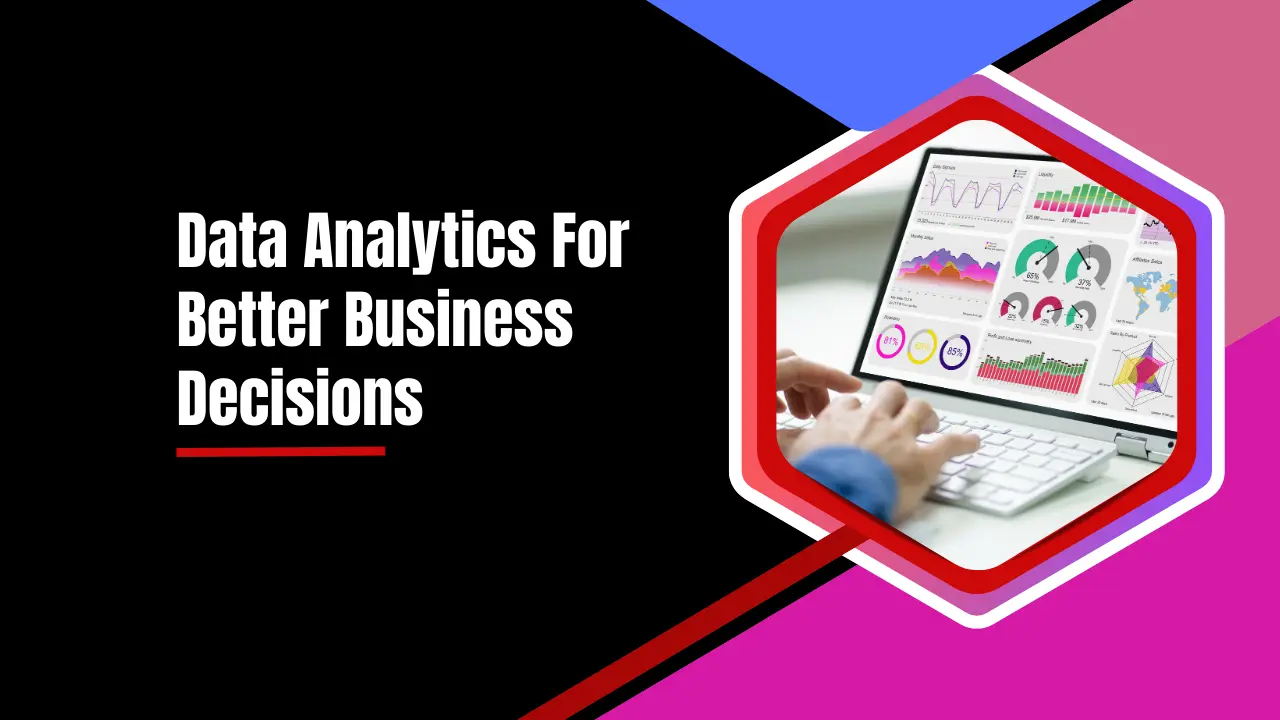
The Power of Data Analytics: How to Make Informed Business Decisions for Maximum Impact
If you are a business owner or professional looking to grow your business and profitability, you must get to know the importance of data analytics. It's a systematic gathering of important data and analyzing it to derive insights to make informed decisions.
Nowadays, running a business isn't as easy as before. The modern business landscape is highly competitive, and your business success is highly dependent on proper data analytics. It helps in identifying crucial information related to marketing, finance, sales, etc. This information is vital for organizations to make informed business decisions.
Data analytics can help companies optimize their supply chains, refine their products and services, improve profitability, ensure sales growth, enhance productivity, and eventually make well-informed and efficient strategic decisions.
Key Takeaways
- Understand the importance of data analytics for informed decision-making and business growth.
- Learn how data-driven insights can optimize operations, improve products, and maintain competitiveness.
- Discover the benefits of choosing the right data tools for effective data collection and analysis.
- Recognize the importance of accurate data. Plus, effective strategies for data collection and interpretation.
- Explore the importance of team collaboration and avoiding common pitfalls in implementing data-driven changes.
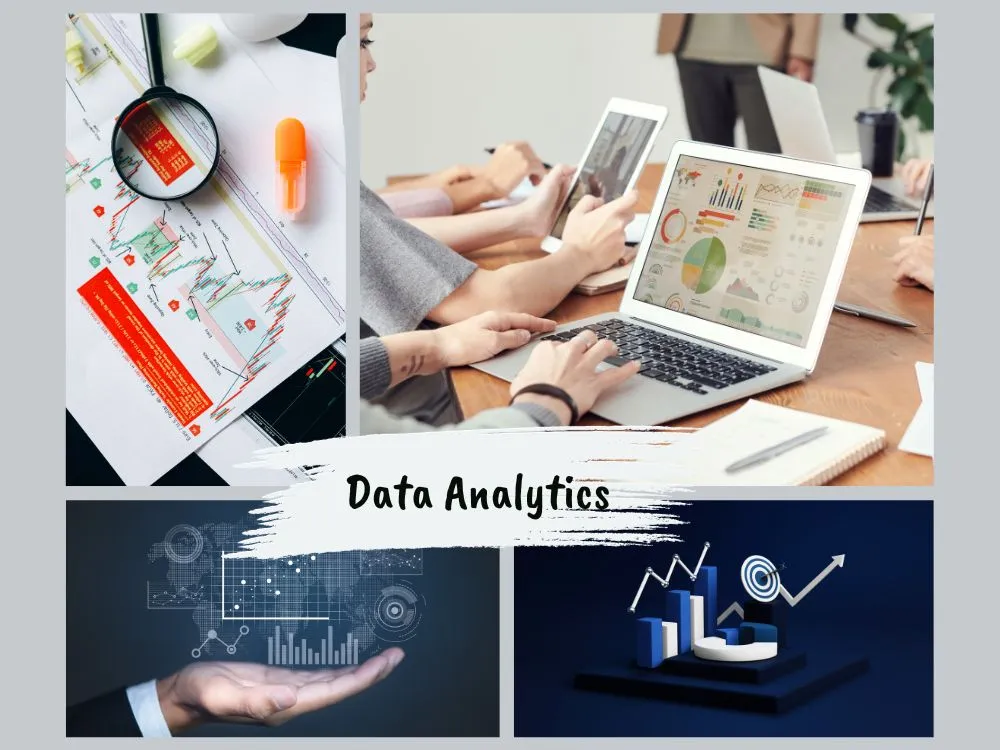
Why Data Should be Used in Decision-Making
We all know that the decision-making process is void without data. Necessary data gathering and analysis are crucial to get insights and make decisions regarding several aspects. Whether you need to find out consumer behavior, market trends, competitor analysis, SWOT analysis, or any other aspects, then data analytics is important.
An organization should gather relevant data to leverage information regarding the SWOT analysis as follows:
- Strengths: Enhancing internal capabilities and competitive advantages.
- Weaknesses: Identifying and addressing areas of improvement.
- Opportunities: Identifying and capitalizing on new business possibilities.
- Threats: Recognizing and mitigating potential risks to the business.
This information can be used to make decisions on behalf of efficient resource allocation, enhance internal strengths and opportunities, and eradicate business threats and weaknesses.
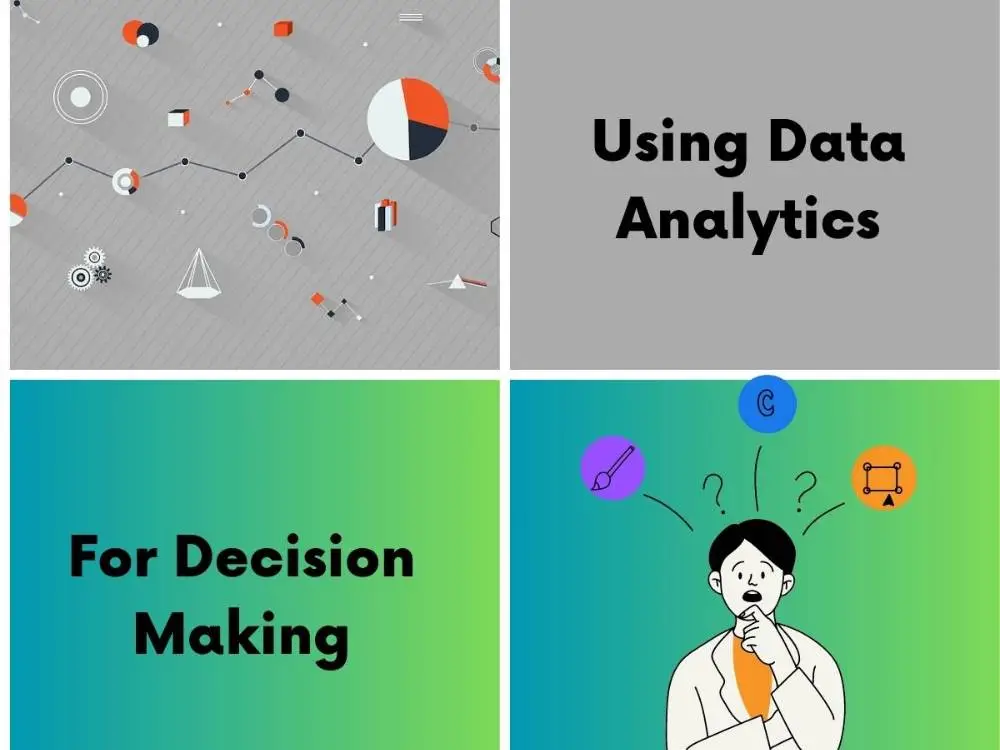
Benefits of Data Analytics in Decision-Making
Data analytics offer numerous advantages to the organization when it's utilized in the decision-making process. It offers clear and real information that is based on factual data and doesn't consider mere intuition.
By comprehensively analyzing historical and real-time data, businesses get vital insights about the most important parameters, like internal and external information, that help make strategic decisions and foster business growth.
Moreover, data analytics is a major player that helps find out inefficiencies and rectify them. Leveraging data analytics enables businesses to maintain a competitive edge and make informed decisions that positively impact their financial performance.
Choosing the Right Data Tools
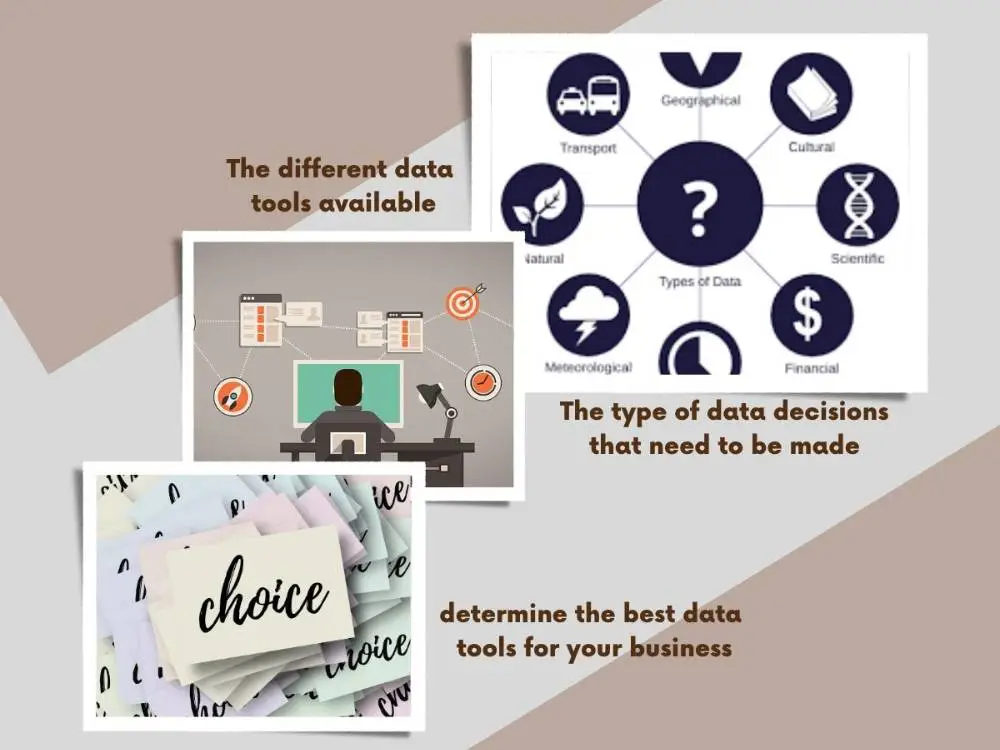
Understanding Your Data Decision Needs
Organizations have diverse data decision needs, and based on the requirements, they can choose the correct data tools. The type of data decisions can be varied as:
- Collect and analyze customer data to make decisions to improve sales.
- Make informed business decisions by tracking and monitoring the performance data of products and services.
Choosing the appropriate data tools is crucial for businesses when making decisions, regardless of the type of data involved. The right selection of data tools is vital to effectively achieve the goals of the decision-making process.
By understanding the type of data decisions that need to be made, an organization can narrow down options and select tools that give proper analytics to meet its business mission.
Exploring Data Tools for Informed Decision-Making
Choosing the right data tool is very crucial. There are different data tools available to gather and analyze data efficiently. Each of these data tools is designed to address specific needs.
In organizations, some of the commonly used data tools are business software, predictive analytics tools, and visualization tools such as Google Charts, which are specifically good at effective data processing and analysis to make informed decisions.
However, selecting the available data tools involves proper consideration of factors such as type of data, the complexity of analysis, and outcome expectation to cater to the business needs to effectively plan their data analysis.
How to Choose the Best Data Tools for Your Business
Choosing the correct data tools can assist businesses in streamlining their operations and achieving strategic goals. There are many data tool options available on the market, and finding out which tools are the most suitable fit for the business needs is an essential task.
The key to making a successful decision lies in understanding the business requirements and priorities. It begins with identifying the specific data needs, like predictive analytics, data visualization, or data management. Thereafter, exploring the features and functionalities of different data tools is vital that align with the business goals.
Another important thing to consider when determining the best data tool is factors such as convenient usage, scalability, and data security. By carrying a systematic approach, businesses can make sure that they select the data tools that are right for their firms and help them unlock insights from the data.
Data Collection and Analysis Best Practices
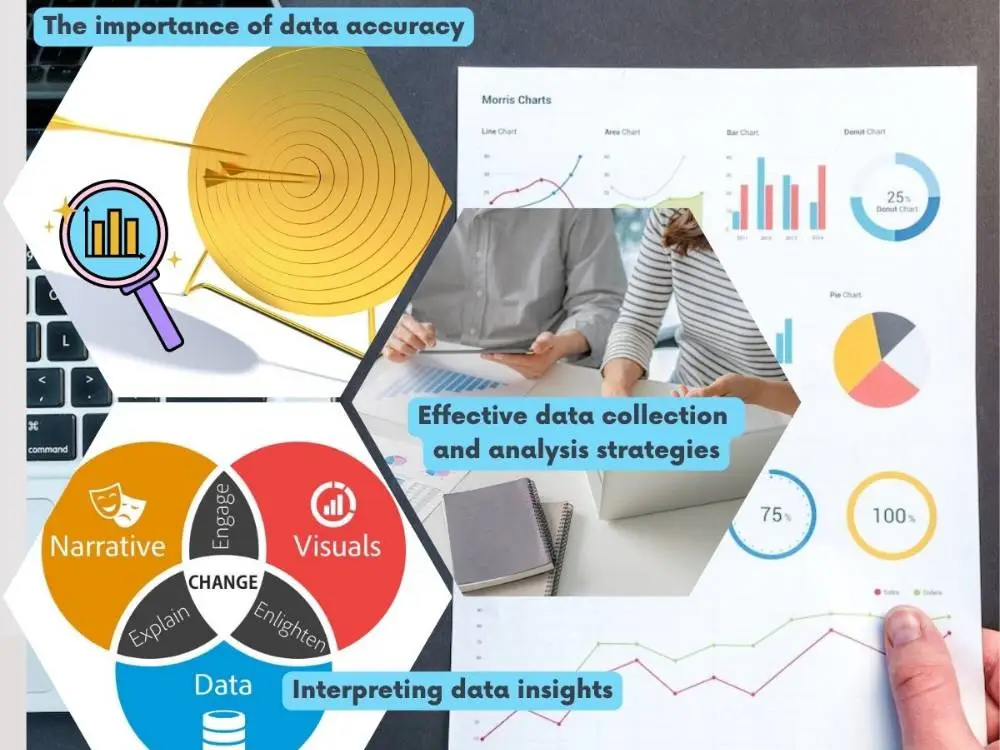
Ensuring Data Accuracy in Decision-Making
Data accuracy is very important as inaccurate data can mislead the information and decision-making process. Before jumping into the decision-making process, every business should make sure that the data it collects for data analysis is accurate. This check is vital to avoid costly mistakes, projections, or decision failures.
By thoroughly checking the accuracy of data, businesses ensure potential growth and success. In contrast, inaccurate data affects consumer satisfaction and damages a company's brand reputation. Thus, ensuring data accuracy is viewed as an essential feature to avoid costly mistakes and remain competitive and successful.
Effective Data Collection and Analysis Strategies
Implementing necessary and effective data collection and analysis strategies is vital in the decision-making process. Organizations use different strategies for data collection. One such valuable strategy is collecting data from various sources rather than relying exclusively on a single source. This approach gives clear insight into comparing the data accuracy.
Businesses should also utilize various software tools to collect and analyze data effectively. For example, Excel or Google Sheets. Business firms also follow another strategy, which involves data analysis experts such as data scientists or statisticians in the process. They can help interpret the data accurately.
By using effective data collection and analysis strategies, businesses can make informed decisions that lead to success.
Interpreting Data Insights for Actionable Decision-Making
One crucial step in data collection and analysis is interpreting data insights to gain valuable knowledge in the process of decision-making. Merely collecting a huge amount of data won't work without a clear interpretation.
This process involves identifying different patterns and anomalies and reconciling the inconsistencies in the data. Also, businesses can forecast the future and make decisions according to that by interpreting data insights. This helps them make improvements.
Implementing Changes Based on Data Analysis

Leveraging Data Insights for Business Improvements
In any business, data insights play a crucial role in understanding the present business condition and pinpointing potential issues to make impactful changes. Organizations have to make impactful changes according to market trends, customer expectations, technological advancements, and many other reasons.
This change is sometimes mandatory to be placed in data insights, which provides essential information to the internal management to make these changes successful. Plus, by implementing the recommendations derived from data analysis, businesses can improve performance and boost profitability.
The Importance of Collaboration Within the Organization
Collaboration is key in the process of implementing changes based on data analysis. Every department of an organization should equally understand the data insights derived from data analysis. It's necessary to know all key metrics and implement changes in their respective areas.
Moreover, every team member from different departments has different skill sets, and they can bring their valuable ideas to the table to make these changes effective and sustainable.
Through collaboration, organizations ensure every employee is involved in the process of implementing changes based on data analysis. This creates a culture that values employees' conceptions and boosts engagement.
Common Pitfalls to Avoid in Data Analytics
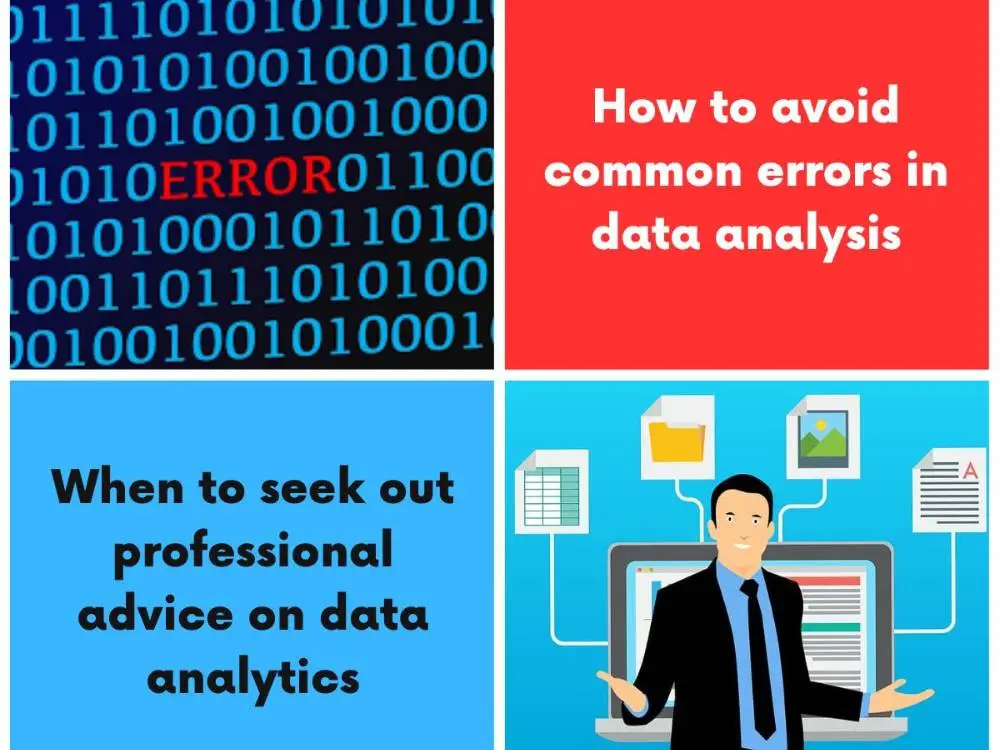
How to Avoid Common Errors in Data Analysis
Data errors may drive organizations to end up in wrong decisions. Therefore, companies should understand the importance of identifying common errors early. This helps implement necessary strategies to rectify those errors.
The most common error in data analysis is using incomplete data and jumping to a conclusion based on this data. To avoid the error of using incomplete data, businesses should double-check the data's status and validity.
Another common error is biased data, which influences the data analysis and leads to misleading results. To avoid these kinds of errors in data, businesses should conduct proper research, utilize AI tools, and follow rigorous methods throughout the entire process.
When to Seek Out Professional Advice on Data Analytics
In different stages of the data analytics process, companies need adequate support or advice from professionals. Data analytics involves a sequence of steps as below. In every step, professional advice is valuable.
- Defining the data analytics requirement: This involves clarifying the goals, identifying the data sources, and determining the specific insights or actions needed from the analysis. Businesses seek professional advice to ensure a comprehensive and well-defined requirement.
- Beginning to collect data from sources: When beginning to collect data from various sources, it's important to seek professional advice to ensure the data collection process is accurate, reliable, and aligned with the defined analytics requirement.
- Cleaning unnecessary data: This step is crucial in data analytics. Seeking professional advice ensures that efficient data-cleaning techniques are employed, resulting in accurate and reliable insights from the remaining relevant data.
- Analyzing the data: It requires expertise in data analytics techniques. Seek professional advice to employ appropriate methods, interpret the results accurately, and derive meaningful insights to inform decision-making processes effectively.
- Interpret and apply the results: Interpreting and applying the results of data analysis is crucial for deriving value from the insights. Seek professional advice to ensure a comprehensive understanding of the findings and to effectively apply them in strategic decision-making processes.
Wrapping Up
Data analytics is crucial in driving business success by enabling informed decision-making. Through systematic gathering and analysis of data, organizations can optimize their operations, refine their offerings, and make strategic decisions based on valuable insights.
Leveraging the power of data analytics, firms deliver a competitive advantage and positively impact financial performance. Also, it's essential to select the right data tools and ensure data accuracy throughout the process.
Collaboration among departments and avoiding common errors can enhance the effectiveness of data analytics. By seeking professional advice and applying the results of data analysis, businesses can unlock growth opportunities and boost profitability.
FAQs
Q1: Why use data in decision-making?
Data is essential for understanding customer behavior, market trends, and competitors. It helps allocate resources efficiently, enhance strengths, and mitigate weaknesses to make informed decisions.
Q2: What are the advantages of data analytics?
Data analytics provides factual information and insights, identifies inefficiencies, and maintains a competitive edge for better financial performance.
Q3: When to seek professional advice in data analytics?
Seek professional advice in defining requirements, collecting data, cleaning unnecessary data, analyzing data, and interpreting and applying results. Professional guidance ensures effective decision-making.
Explore Related Posts
https://smarttoolsai.com/post/improve-data-presentation
https://smarttoolsai.com/post/quality-of-work-performance-review-phrases-and-examples
.webp)